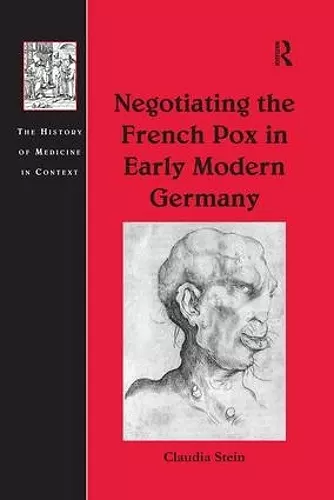Negotiating the French Pox in Early Modern Germany
Format:Paperback
Publisher:Taylor & Francis Ltd
Published:9th Sep '16
Currently unavailable, and unfortunately no date known when it will be back
This paperback is available in another edition too:
- Hardback£150.00(9780754660088)

This book explores the identity of the 'French disease' (alias the 'French pox' or 'Morbus Gallicus') in the German Imperial city of Augsburg between 1495 and 1630. Rejecting the imposition of modern conceptions of disease upon the past, it reveals how early modern medical theory facilitated enormous flexibility in defining disease, and how disease identification was a local matter, and one of constant negotiation and renegotiation. Drawing on a wealth of primary source material this work combines concern with the conceptualisation of the disease with its practical application, and argues for the inseparability of both. It focuses on how theoretical understanding of the pox shaped the various therapeutic reactions, and vice versa. It exemplifies this in the specific socio-cultural context of sixteenth- and seventeenth-century Augsburg, through an investigation of the city's municipal and private pox hospitals. Combining medical, religious, economic, municipal and institutional history this book offers a fascinating insight into how early modern society came to terms with disease both in a practical and theoretical sense. This revised English translation of Dr Stein's original German book adds new layers of understanding to a fascinating but complex subject.
’Anglophone historians will welcome the updated translation of Claudia Stein’s 2003 Die Behandlung der Franzosenkrankheit in der Frühen Neuzeit am Beispiel Augsburgs, to date the most thorough study of the French pox in early modern Germany. It fills a major gap in early modern English language scholarship where research on the pox outside of Italy and England has been relatively sparse.’ Social History of Medicine ’Overall, this is a thoughtful and highly readable study, which persuasively makes a number of arguments of broader significance for historians of medicine. Stein reminds us that diseases are changeable and that they were defined flexibly in early modern Europe, and brings welcome attention to the often overshadowed significance of the diagnostic act. A significant conclusion is that the pox had a less dramatic impact”both on society and on medical theory and practice”than is often claimed. But perhaps this study’s most important achievement is its successful integration of the history of the body and the history of disease: a model which others will no doubt follow.’ German History ’Negotiating the French Pox is an extraordinary example of how practical, administrative, and narrative accounts of illness can be read along with works of medical theory to construct a rich and complex view of Renaissance illness and healing.’ Renaissance Quarterly ’... an indispensable study to approach the highly relevant part of the early socio-cultural history of the French pox that took place in German lands and was played by German actors.’ Medical History
ISBN: 9781138253230
Dimensions: unknown
Weight: 470g
254 pages